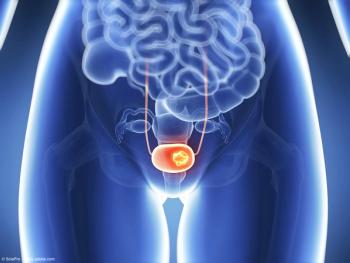
Bladder Cancer
Latest News
Video Series

Latest Videos
Shorts










Podcasts
CME Content
More News

The study assessed descriptive sequencing and oncologic outcomes among patients receiving gene therapy for BCG-unresponsive NMIBC.

The code, J9282, went into effect on January 1, 2026.

Ilaha Isali, MD, MSc, identifies major unresolved gaps in sex-specific bladder cancer research.

As the year comes to a close, we revisit some of this year’s top content on bladder cancer.

The review highlights the role of sex chromosome biology, particularly genes on the X chromosome that escape inactivation.

The combination yielded significant improvements in event-free survival, overall survival, and pathologic complete response rates vs neoadjuvant chemotherapy.

The combination demonstrated a disease-specific survival rate of 98.7% at 12 months and 96.0% at 36 months.

Bradley McGregor, MD, contextualizes recent data on emerging treatment regimens in high-risk, BCG-naïve NMIBC.

Abhishek Srivastava, MD, discusses the potential impact that UGN-103 might have on the treatment landscape for LG-IR-NMIBC.

"In my experience, when a treatment is well-tolerated and given on a predictable schedule, patients are more likely to adhere to therapy and remain engaged in long-term follow-up," Chauhan writes.

Daneshmand also emphasized the evolving, highly collaborative role between urologists and medical oncologists as perioperative systemic regimens expand.

Laura Bukavina, MD, MPH, MSc, recapped a debate at SUO 2025 on how to appropriately classify high-grade bladder tumors.

Nogapendekin alfa inbakicept was approved in combination with BCG in the US in April 2024.

Fed Ghali, MD, discusses the potential opportunity to de-escalate therapy in patients receiving perioperative EV/pembro.

"If 2025 showed us anything, it is the power of combining scientific progress with public engagement," writes Michael S. Cookson, MD, MMHC, FACS.

Gal Wald, MD, highlights patient-reported outcomes from a phase 2 trial of intravesical gemcitabine plus BCG for patients with BCG-exposed high-grade NMIBC.

The FDA has selected detalimogene voraplasmid to participate in the Chemistry, Manufacturing, and Controls Development and Readiness Pilot Program.

The investigators reported a high-grade CR rate at any time of 72.4% (21 of 29 patients).

Eugene Pietzak, MD, highlights the background and design of the ongoing phase 3 GAIN trial, exploring the combination of gemcitabine and BCG in BCG-exposed NMIBC.

Siamak Daneshmand, MD, emphasizes that, at present, optimal patient selection remains unclear because resistance mechanisms and predictive biomarkers are not yet well understood.

DFS rate was 85.3% at 6 months (95% CI, 71.6-92.7), 74.3% at 12 months (95% CI, 59.2-84.6), and 69.2% at 18 months (95% CI, 53.4-80.6).

In patients with high-grade T1 disease, high-grade EFS was 100% and 3 months and at 6 months and 87.5% at 9 months.

Laura Bukavina, MD, MPH, offered her thoughts on the significance of the KEYNOTE-905 data and highlighted some remaining questions surrounding the regimen.

The overall CR rate was 83.7% (95% CI, 70.3-92.7).

Michael S. Cookson, MD, MMHC, FACS, shares his thoughts on the most exciting recent advances in bladder cancer treatment.































